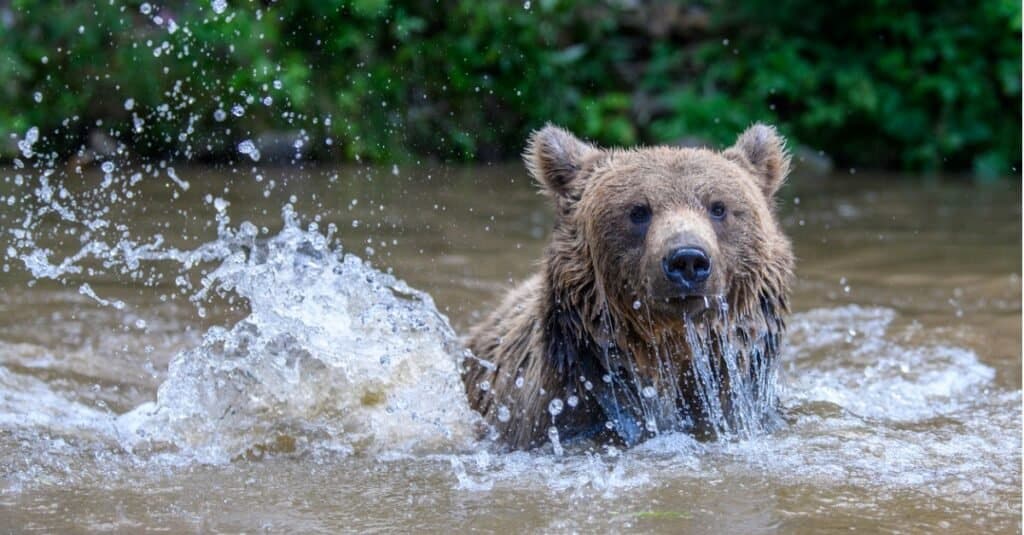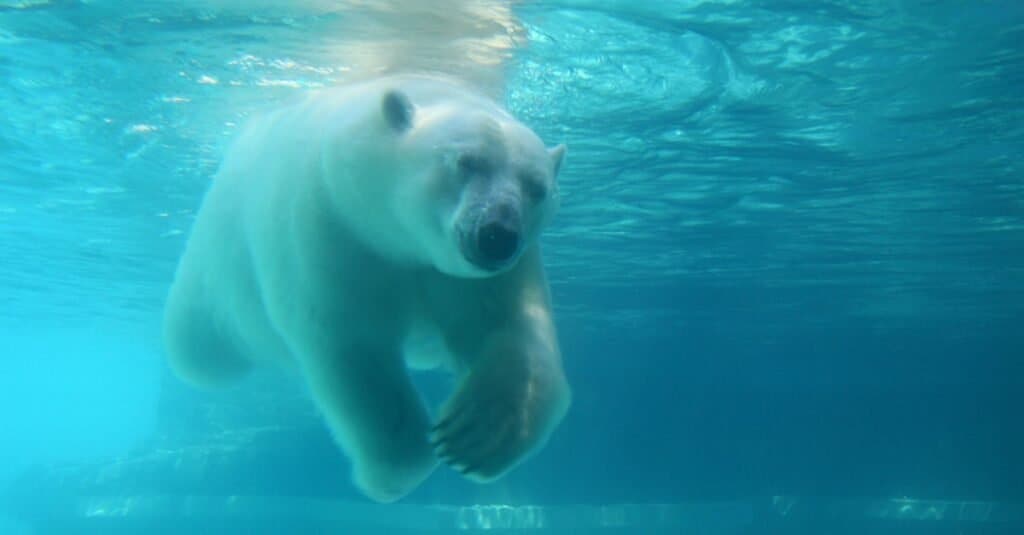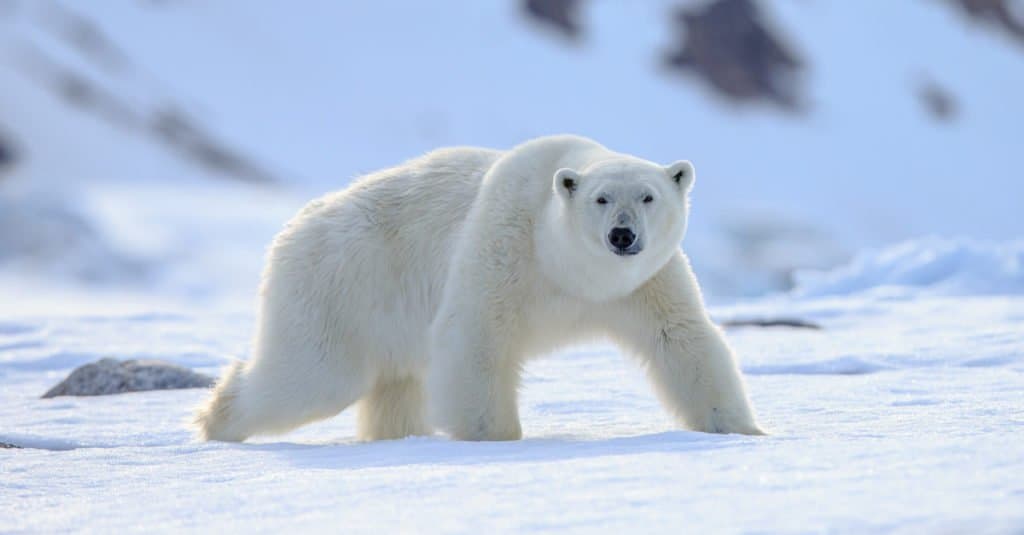Michael Phelps has so many Olympic medals on display that they would probably weigh him down if he wore them all at once! As one of history’s most accomplished swimmers, he seems to have been made for the water. However, he is still a land mammal, even if the water is like a second home to him. You might also be astonished to find that several other land mammals can reach record-breaking speeds when swimming. Bears are one such example. These land mammals spend so much time in the water that they can be considered “semi-aquatic.” Can bears swim faster than Michael Phelps, then? Or is he really the land animal with the fastest swimming speed? This article aims to answer this question!
How Fast Can Michael Phelps Swim?

This picture was taken one year after Phelps dominated the 2012 London Olympic Games. Phelps won 18 gold medals and set seven world records at the time.
©iStock.com/ALEJANDRO SALA
Phelps has clocked speeds of around six miles per hour while in his prime. He is among the quickest swimmers that have ever lived, and he holds numerous Olympic records to prove it. Phelps is undoubtedly so quick in the water that he might finish a race three times before the majority of individuals complete it once. To put this into perspective, the average person can swim up to 2 mph.
What makes Michael Phelps such a quick swimmer, then? Phelps’ body-to-leg proportion and the broad shoulders of his physique are two genetic variations that may contribute to his incredible swimming speed. His double-jointed ankles also work like size 14 flippers! There’s no doubt that his passion and dedication to the sport, along with his genes, have helped him succeed.
Are Bears Fast Swimmers?

Brown bears have been known to swim between islands as far as 1.6 kilometers apart.
©iStock.com/Byrdyak
Even though water is not a bear’s natural environment, you might be shocked to hear that it can swim fairly quickly. This is actually not as surprising when you consider how much time they spend in the water in search of food like salmon and other fish. They have also learned to swim so they can move around and deal with the weather when they are trying to hibernate. In fact, when a mother bear’s pups leave their hibernation lair, one of the first things she teaches them is how to swim. So, which bears are the fastest swimmers known to exist? Keep reading to find out!
What Type of Bear is the Fastest Swimmer?

Polar bear swimming underwater. Polar bears can swim for long distances and steadily for many hours to get from one piece of ice to another.
©Vladimir Gjorgiev/Shutterstock.com
The quickest swimming bears are undoubtedly polar bears, and the reason is clear. Polar bears have undergone an evolutionary change to make them more efficient in the water than other bear species. Their longer nose, head, and torso help them navigate the water with less resistance. Plus, a polar bear’s thick covering of fat, which may be up to 4.3 inches, aids in keeping them warm as well as enabling them to float and swim more easily.
Along with using their rear paws much like a rudder to steer, they also utilize their front paws as paddles to accelerate themselves forward. These factors are essential to their existence given the habitat they reside in. For example, polar bears are the only type of bear that are classified as marine mammals since they spend the majority of their life on the sea ice of the Arctic Ocean. They essentially depend on the ocean for both their habitat and food. So just how fast does a polar bear swim and can Michael Phelps outswim one in theory? The next section will give you the answer!
So, Can Michael Phelps Swim Faster Than A Polar Bear?
According to a number of reports, polar bears may attain top speeds of roughly 6 mph (6.2 precisely). This appears to equal the fastest swimming speed of Michael Phelps. But in order to answer this question as correctly as possible, a number of things must be considered.
For instance, it’s crucial to remember that Michael Phelps swims at varying speeds depending on the swim competition, whereas the consistent swim average of polar bears is 6 mph. This speed is not Phelps’s average pace, but rather his highest record during his prime. Although Michael is reported to have reached this record, he has won the majority of his races by swimming more slowly. In fact, his career’s typical speed is estimated to have been around 4.5 mph. This demonstrates that Phelps won through consistency rather than just pure speed.
Bears are considered to be partially aquatic animals because they can swim for long periods of time at a steady pace. In fact, polar bears are known for being excellent swimmers, and they have been seen swimming for days at a time for up to 62 miles! These steady paces are sure to beat a sprint swimmer like Michael Phelps.
Could Michael Phelps Swim 100 miles From the Ocean to Shore?
Would Michael Phelps be capable of swimming a hundred nautical miles from ocean to shore? While serving time at the Fulton County Jail in Atlanta, Georgia, rapper Young Thug posed this question to his Twitter followers. With everything Phelps has accomplished, it’s reasonable to speculate how far his skills might take him.
Phelps possibly had the physical ability to swim 100 miles nonstop under ideal conditions and ocean currents, in his prime. However, this is not something he was ever physically or emotionally trained for. Now, six years into retirement, is it something he could still do? Probably not at all.
The polar bear certainly appears to be the likely winner if it were a long swimming contest between the two. And, even though it would be a very tight race in a brief sprint, the polar bear would probably win in this scenario as well.
In Conclusion

The Polar Bear is a solitary animal that can not only run at speeds of up to 25mph but its strong ability to swim at 6mph makes it a true apex predator within its environment. These semi-aquatic mammals can hunt both on the ice and in the water and have been known to swim vast distances across the open ocean in search of food.
©Vaclav Sebek/Shutterstock.com
Whatever his speeds—recorded or unrecorded—or if a polar bear could outswim him, Phelps is unquestionably the best human swimmer of all time thus far. During the Phelps era, just the mention of his name would send ‘shivers’ through competitive swimmers. Phelps has proved to be the most successful pro swimmer through his 28 Olympic Championship victories (23 gold).
The bears themselves are very amazing creatures, too! It is quite a remarkable feat for a land animal to swim at such unheard-of speeds. Being incredibly intelligent and adaptable, they have long been able to live and thrive in their aquatic-laden habitats. Therefore, even if it is entertaining to compare the swim speeds of these two extraordinary mammals (Phelps vs. Bear), they are both clearly incredible in their own right.
Up Next:
- Discover the Largest Polar Bear Ever Recorded
- 10 Incredible Polar Bear Facts
- What Is The Bite Force Of A Polar Bear
The photo featured at the top of this post is © Mihai_Andritoiu/Shutterstock.com
Sources
- Celeb Answers, Available here: https://celebanswers.com/how-fast-can-michael-phelps-swim-top-speed-revealed/
- Sports Keeda, Available here: https://www.sportskeeda.com/swimming/how-fast-olympic-legend-michael-phelps-swim
- Arctic Kingdom, Available here: https://resources.arctickingdom.com/why-polar-bears-love-to-swim#:~:text=What%20Makes%20Them%20Good%20Swimmers,a%20rudder%20to%20steer%20them.
Thank you for reading! Have some feedback for us? Contact the AZ Animals editorial team.






